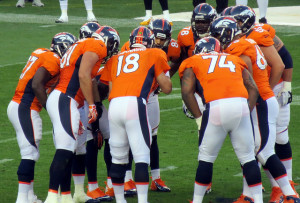 Every football season begins the same way for just about every team at every level. Each team has high hopes of a championship; develops a playbook; positions its players at their areas of strength; and has weeks of training and practice. Imagine how foolish it would look however if at the season opener, the offense went out on the field, huddled up, called the play… but never left the huddle.
Every football season begins the same way for just about every team at every level. Each team has high hopes of a championship; develops a playbook; positions its players at their areas of strength; and has weeks of training and practice. Imagine how foolish it would look however if at the season opener, the offense went out on the field, huddled up, called the play… but never left the huddle.
As ridiculous as the above scenario may be, unfortunately it is a visual image of what happens in many churches all over the nation. Teachers have been trained and Bible study lessons have been prepared. Rooms have been furnished or homes have been cleaned and made ready for company. But the play that our Lord and Savior has given us is to be fishers of men; to share the Gospel; to make disciples! Can I share a three words of encouragement with you if this scenario describes your church and small group.
Run the Play!
The fifth ingredient of Flake’s Formula is “Go after the people.” Rick Howerton and David Francis define it using one word – deploy. Jesus said “Go make disciples…” It is an imperative direction. It requires action. Groups that choose to always remain in the huddle are not going to engage people with the Gospel. Many churches use a passive approach of engagement and outreach. Announcements about Bible study groups are made from the pulpit. But announcements are passive.
Here are three suggestions to help deploy your church’s groups (or your group):
Weekly outreach
Weekly outreach fell out of favor years ago. There are all kinds of reasons given as to why churches no longer have weekly outreach, such as; families do not like people knocking on their door; participation by church members is low; events at the church facility have replaced outreach; and… well it just isn’t cool anymore.
I was the interim education minister at a church recently. This church had not done ANY outreach at all for over a decade. They had adopted a “if they need us they know where to find us” approach. Now that is the ultimate “passive outreach” strategy! Instead of beginning an ongoing, 52 weeks of of outreach plan, we began with an 8 week outreach burst. We met on Sunday evenings and went visiting! After eight weeks, our outreach teams had visited in the homes of over 350 people! Our teams led people to the Lord. We saw people baptized as a direct result of our action-oriented strategy. Every week we heard comments like this; “We have visited several churches the past couple of months, but your church is the first church that ever came to visit us.” Guess whose church these people joined! (This church continues to effectively use this strategy of short, 6-8 week outreach bursts 3-4 times a year.)
Connection Day
You may remember it as Friend Day or High Attendance Day, but set aside a couple of days a year that encourages and organizes church members to invite friends to come to church with them. In other words, “run the play”. If only 10% of your people respond, your church will have a lot of new faces present and it will engage a lot of people that need Christ and community.
Special Events
If your church’s process for engaging people with the Gospel is to ultimately to get them into a small group or Sunday School, shouldn’t the church’s events help pave the way for that to happen? Every event hosted by the church should point participants toward small groups. Register every person present (you can not follow up on people if you have no contact information). Enlist a person or two to share their story at the event of how their small group has ministered and helped them during a difficult time. Always have a table or booth set up with information about your groups and a person or two to help answer questions or provide needed information.
Deploying group members is vital to making disciples. As group leaders it is important for us to create opportunities in addition to our Bible studies to help deploy our group members.
It is one thing to call the play…. but it is another thing to actually run the play.
Run the Play!!
_______________
Bob Mayfield is the Sunday School/Small Group specialist for the Baptist General Convention of Oklahoma (BGCO). Bob also has his own blog at bobmayfield.com. The BGCO also has an online training site with over 200 videos available at reconnectss.com.
Follow Bob on Twitter – @bobmayfield, or on Facebook – theBobMayfield


